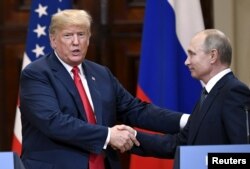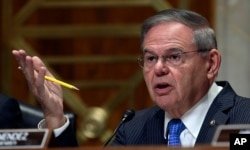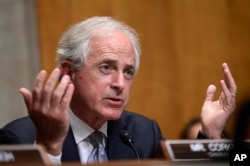Testifying before a Senate panel, U.S. Secretary of State Mike Pompeo on Wednesday declined to divulge details of President Donald Trump's private meeting with Russian President Vladimir Putin in Helsinki last week, but declared the United States does not recognize Russia's 2014 annexation of Crimea.
"Presidents are entitled to have private meetings. … I think it was more than appropriate that President Trump meet with Vladimir Putin," Pompeo said in the first Capitol Hill appearance by a member of Trump's national security team since the Helsinki summit, at which the president questioned U.S. intelligence on Russian election meddling.
Trump later sought to clarify his position on Russian interference. Pompeo told lawmakers the president was absolutely clear on Russia's actions in the 2016 U.S. presidential election.
"He [Trump] has a complete and proper understanding of what happened. I know — I briefed him on it for over a year," the secretary of state and former CIA director said after listing steps the administration had taken to counter Russia, from imposing sanctions to sending military aid to Ukraine.
"The United States does not and will not recognize the Kremlin's purported annexation of Crimea," Pompeo stressed, adding that economic sanctions against Moscow would remain "until Ukraine's territorial integrity is restored."
Moments earlier, the White House announced that a planned second Trump-Putin summit in the United States would not occur until 2019.
National security adviser John Bolton said Trump wanted to wait until after special counsel Robert Mueller's investigation into the Russian interference in the 2016 election was completed.
"The president believes that the next bilateral meeting with President Putin should take place after the Russia witch hunt is over, so we've agreed that it will be after the first of the year," Bolton said in a statement.
WATCH: Pompeo Declines to Reveal What Trump and Putin Discussed
Testy Senate exchange
In a series of often testy exchanges with Pompeo, lawmakers of both parties expressed continuing concerns about the Helsinki summit, Trump's approach to North Korea as well as NATO, and the administration's overall strategy for America on the world stage.
Senate Foreign Relations Committee Chairman Bob Corker, a Tennessee Republican, described Trump as "submissive and deferential" to Putin at the Helsinki joint news conference.
The committee's top Democrat, Bob Menendez of New Jersey, said Congress and the American people had a right to know what Trump and Putin might have agreed to behind closed doors, and he accused the president of cozying up to brutal dictators like North Korean leader Kim Jong Un.
"Frankly, the Singapore [Trump-Kim nuclear summit] agreement seems more the art of concessions than the art of the deal," Menendez said.
Pompeo said he'd had fruitful conversations with North Korean officials since the June summit, but added that "until North Korea eliminates its weapons of mass destruction, our sanctions and those of the United Nations will remain in effect."
The secretary of state also defended the administration's handling of Iran, saying, "Financial pressure [on Tehran], our withdrawal from the nuclear deal, and our full-throated support for the Iranian people … are having an impact."
Pompeo defended Trump's discussions with adversaries like Putin, saying, "We can't make progress on issues of mutual concern unless we are talking."
Corker signaled bipartisan skepticism about the administration's handling of global affairs was likely to continue.
"The administration tells us, 'Don't worry, be patient, there's a strategy here.' But from where we sit, it appears that in a ready-fire-aim fashion, the White House is waking up every morning and making it [U.S. policy] up as they go," the chairman said.









